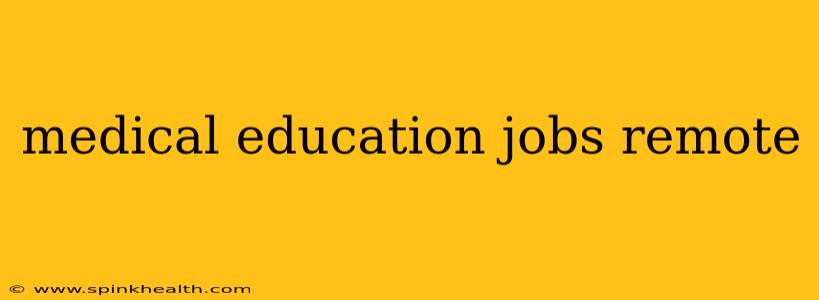The world of healthcare is evolving, and with it, so are career opportunities. For those seeking a fulfilling career in medical education with the flexibility of remote work, the possibilities are surprisingly vast. Gone are the days where medical educators were confined to lecture halls; now, the digital landscape opens doors to innovative teaching methods and a geographically unbound career. Let's explore the exciting world of remote medical education jobs and answer some frequently asked questions.
What Types of Remote Medical Education Jobs Exist?
The beauty of remote medical education lies in its diversity. It's not just about lecturing; it's about leveraging technology to create engaging and impactful learning experiences. Think beyond the traditional classroom. Picture this: you're crafting online courses for medical professionals, developing interactive simulations for surgical training, or mentoring students across continents through virtual one-on-one sessions.
Some common roles include:
- Online Course Developers: Creating engaging and informative online courses, incorporating multimedia elements, and ensuring the curriculum aligns with medical standards.
- Medical Curriculum Designers: Developing and structuring medical curricula for online learning platforms, balancing theory and practical application.
- Virtual Instructors/Tutors: Guiding students through online learning modules, providing personalized feedback, and answering questions through various digital channels.
- Medical Simulation Developers: Designing and implementing virtual simulations for medical training, promoting hands-on experience in a safe and controlled environment.
- Medical Writer/Editor: Crafting clear, concise, and accurate medical educational materials, ensuring the information is easily digestible and aligned with best practices.
- E-learning Platform Managers: Overseeing the technical aspects of online learning platforms, ensuring smooth functionality and accessibility for learners.
What are the Qualifications for Remote Medical Education Jobs?
The specific qualifications vary depending on the role, but generally, a strong background in medicine or healthcare is crucial. Many positions require:
- Advanced Degree: A medical degree (MD, DO), a doctorate in a relevant field (PhD, EdD), or a master's degree in health sciences, education, or a related field.
- Teaching Experience: Proven experience in teaching or training medical professionals or students. This could include classroom experience, mentorship roles, or developing educational materials.
- Technical Skills: Proficiency in online learning platforms, educational technologies, and various software programs used in medical education.
- Excellent Communication Skills: The ability to communicate complex medical information clearly and concisely, both verbally and in writing.
How Do I Find Remote Medical Education Jobs?
The search for remote medical education jobs often requires a proactive approach. Utilize a multi-pronged strategy:
- Online Job Boards: Explore job boards specializing in healthcare and education, filtering your searches for "remote" or "work from home" positions.
- Professional Networking: Engage with professional organizations in medical education and healthcare. Networking events and online communities can lead to valuable connections and job opportunities.
- Company Websites: Directly check the career pages of universities, hospitals, medical technology companies, and online learning platforms that offer medical education programs.
What are the Benefits of Remote Medical Education Jobs?
The benefits extend beyond the obvious flexibility. A remote medical education role offers:
- Geographic Flexibility: Work from anywhere with a reliable internet connection.
- Work-Life Balance: Greater control over your schedule and the ability to integrate work with personal commitments.
- Increased Job Satisfaction: Many find remote work enhances job satisfaction due to increased autonomy and flexibility.
- Access to Diverse Opportunities: Remote work opens doors to a wider range of opportunities, potentially working with institutions across the globe.
Are Remote Medical Education Jobs In Demand?
The demand for remote medical education professionals is steadily increasing. As technology continues to revolutionize healthcare education, the need for skilled individuals who can design, deliver, and manage online medical education programs is growing rapidly.
What are the Challenges of Remote Medical Education Jobs?
While rewarding, remote work presents some unique challenges:
- Isolation: Maintaining professional connections and avoiding feelings of isolation requires effort and proactive engagement.
- Technology Dependence: Reliability on technology and potential technical issues can sometimes disrupt workflow.
- Maintaining Professional Boundaries: Balancing work and personal life can be challenging when working remotely.
The field of remote medical education is ripe with opportunities for those passionate about teaching and committed to advancing medical knowledge. By embracing the challenges and leveraging the unique benefits, you can carve a successful and fulfilling career in this dynamic sector.

